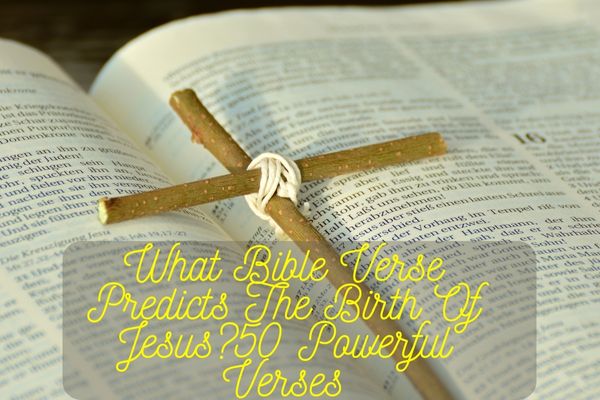The birth of Jesus Christ, a pivotal event in Christianity, is foretold in various passages throughout the Old Testament of the Bible. These prophecies serve as profound declarations that provide a glimpse into the divine plan for the arrival of the Messiah. Exploring these prophetic verses not only enriches our understanding of What Bible Verse Predicts The Birth Of Jesus?, but also the significance of Jesus’ birth and reinforces the intricate connection between the Old and New Testaments.
In this exploration, we will unravel the scriptural passages that predict the birth of Jesus, seeking to comprehend the depth and divine foresight embedded in these timeless verses.
What Bible Verse Predicts The Birth Of Jesus?
The arrival of Jesus Christ, the central figure of Christianity, is an event shrouded in both historical significance and divine mystery. From the bustling streets of Bethlehem to the quiet contemplation of ancient prophecies, the question of which Bible verse definitively predicts Jesus’ birth remains a topic of fascinating exploration.
While pinpointing a single verse as the sole harbinger of Jesus’ coming might be an oversimplification, the history of Scripture offers several threads woven together to form a compelling picture of Christ’s arrival. Here, we embark on a journey through some of the most prominent verses that announce the Messiah’s advent:
1. The Protoevangelium: A Glimmer in the Garden (Genesis 3:15)
Nestled within the very first book of the Bible, Genesis 3:15 offers a remarkable prophetic glimpse. After the expulsion from Eden, God declares to the serpent: “I will put enmity between you and the woman, and between your offspring and hers; he will crush your head, and you will strike his heel.” This verse, known as the Protoevangelium, lays the foundation for the ongoing struggle between good and evil, hinting at the eventual triumph of a descendant who will overcome the serpent’s power. Though not explicitly mentioning Jesus, this verse sets the stage for the coming Messiah who will ultimately vanquish evil.
2. The Royal Lineage: Tracing the Davidic Line (2 Samuel 7:12-16)
Centuries later, God makes a covenant with King David, promising an everlasting dynasty: “When your days are over and you rest with your ancestors, I will raise your offspring to succeed you, your flesh and blood, and I will establish his throne forever.” This passage, found in 2 Samuel 7:12-16, establishes the Davidic lineage, from which Jesus, the promised Messiah, will eventually be born. This fulfils the prophecy spoken to Abraham generations earlier, solidifying the Jewish expectation of a coming king descended from David.
3. The Prophecy of Isaiah: A Light in the Darkness (Isaiah 7:14)
Moving forward to the book of Isaiah, another intriguing verse emerges. In Isaiah 7:14, the prophet proclaims: “Therefore the Lord himself will give you a sign: The virgin will conceive and give birth to a son, and she will call him Immanuel.” This verse, often considered one of the most explicit prophecies of Jesus’ birth, clearly foretells the arrival of a child born to a virgin, named Immanuel, meaning “God is with us.” This prophecy resonated deeply with the Jewish people, offering a beacon of hope amidst the darkness of Assyrian oppression.
4. Micah’s Humble Herald: The Birthplace of the King (Micah 5:2)
While Isaiah focuses on the miraculous nature of Jesus’ birth, Micah paints a picture of the Messiah’s humble origins. In Micah 5:2, the prophet declares: “But you, Bethlehem Ephrathah, though you are small among the clans of Judah, out of you will come for me one who will rule over Israel, whose origins are from of old, from eternity.” This verse pinpoints Bethlehem as the birthplace of the coming king, fulfilling the prophecy delivered to Joseph in a dream, and connecting Jesus’ arrival to the ancient lineage of David.
Messianic Prophecies:
- Isaiah 7:14: This verse, often referred to as the Immanuel prophecy, speaks of a virgin conceiving and bearing a son named Immanuel. While interpreted in various ways, many see it as a prefiguration of Mary’s miraculous pregnancy and the birth of Jesus.
- Micah 5:2: This verse predicts the Messiah’s birthplace as Bethlehem, a small town in Judea. When Joseph and Mary travelled to Bethlehem for the census, they fulfilled this prophecy, setting the stage for Jesus’ birth.
- Psalm 22: This psalm is often seen as a foreshadowing of Jesus’ crucifixion. Verses like “They pierced my hands and my feet” and “They cast lots for my garments” eerily mirror the events of his death. While not a direct prediction of birth, it paints a picture of the sacrifice to come.
Prophecies of Kings and Kingdoms:
- Genesis 49:10: This verse, spoken by Jacob on his deathbed, prophesies that the sceptre (symbol of rulership) will not depart from Judah until Shiloh comes. Many interpret Shiloh as a reference to the Messiah, predicting a descendant of Judah who would be a rightful ruler.
- Daniel 7:13-14: This vision describes a figure “like a son of man” coming on the clouds to receive everlasting dominion. While open to interpretation, some see it as a prophecy of Jesus’ second coming, potentially hinting at his future reign as the promised king.
Beyond Literal Interpretations:
It’s important to note that interpreting these verses can be complex and nuanced. Different scholars and traditions hold diverse perspectives on their exact meanings and fulfillments. However, the beauty lies in the history they create, weaving together themes of hope, promise, and the coming of a saviour.
Conclusion
The examination of these prophetic verses illuminates the remarkable interconnectedness between the Old Testament prophecies and the fulfilment of those prophecies in the New Testament with the birth of Jesus. From the enigmatic words of ancient prophets to the fulfilment of those predictions in the life of Christ, the narrative unfolds as a testament to the divine orchestration of history.
The birth of Jesus foretold with precision and purpose, serves as a powerful reminder of the continuity of God’s redemptive plan throughout the ages. As we reflect on these prophecies, we find not only historical validation but also an invitation to contemplate the profound spiritual significance embedded in the birth of the Savior, bringing hope and salvation to humanity.






